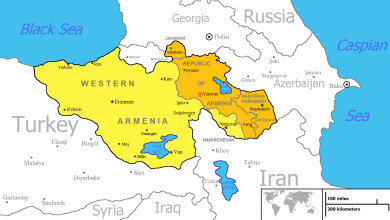German report raises the spectre of Political Islamism

Though the motivation for commissioning the report is political, yet the recommendations if acted upon sincerely, they can lead to better community relations in Germany.
In the backdrop of the increasing Islamophobia across the world, Germany’s leading political party seems to have taken a right step towards analysing the problem and its offshoots.
The ruling Christian Democratic Union (CDU), having occupied the chancellor’s office for 57 of the 72 years of the Federal Republic of Germany’s existence, and part of the largest parliamentary group in the German Bundestag, and its Bavarian sister party, the Christian Social Union (CSU), has approved a wide-ranging strategy paper to contain the spread of political Islam in Germany.
The strategy paper, “Preserving Free Society, Promoting Social Cohesion, Fighting Political Islamism,” assertsthat a growing number of areas in Germany, where Sharia law overrules German law, are in danger of becoming “parallel societies.”
The paper also warns that certain foreign governments control many mosques and Islamic associations in Germany, which threaten Germany’s liberal democratic order.
The authors of the paper argue that a recent wave of jihadist attacks in Germany and elsewhere in Europe requires urgent measures to stop the “poison” of extremist ideology from gaining further ground on the continent.
The new strategy
The paper, which whole-heartedly commends law-abiding Muslims who respect Germany’s democratic order, argues that the debate about Islamism in Germany is often reduced to violence and terror, but that it is necessary to focus more on ideology.
The proposals include improving research and analysis of political Islam in Europe and the methods by which it spreads; banning the foreign funding of mosques; and reducing the number of foreign imams active in Germany.
Arguably the most important proposal involves reversing the German government’s long-standing policy of supporting extremist groups in Germany, which, under the guise of promoting dialogue, has legitimised those groups and fuelled the spread of political Islam in Germany.
The paper says, “Focusing only on the violent part of Islamism, Islamist terrorism, does not do justice to the overall problem. Islamism — like other extremisms — has an ideological basis and the aim must be to explore this ideological underground.”
Action Plan
The strategy paper offers a Five-Point Action Plan aimed at understanding and fighting political Islam:
First, it calls for supporting basic research on political Islamism in Germany and Europe. This includes: establishing academic chairs to focus on Islamism and its structures, implementing a scientific study to better understand the extent to which political Islamism is influencing children, young people and adolescents.
Secondly, it urges terminating state cooperation and contractual relationships with organisations of political Islamism.
Thirdly, it calls for training Imams in Germany. The proposal calls for providing academic and spiritual training for imams in Germany, while maintaining religious freedom and the separation of state and religious communities.
Fourthly the paper calls for increased transparency of membership structures and financing flows, including donations, subsidies, contracts and collaborations, to the federal tax office by the mosques functioning in Germany.
Finally it calls for Preventing radicalisation, throughimproved cooperation between federal, state and local governments and civil society. Through investigating the risk of radicalisation processes in the penal system in Germany; and expanding information and awareness programs for specialists from the areas of police, justice, school and education, social work, youth welfare and refugee aid, among others.
Mouhanad Khorchide, a Lebanese-Austrian Islamic theologian and sociologist who is a professor of Islamic pedagogy at the University of Münster in Germany, speaking to Soeren Kern of the New York-based Gatestone Institute said that the policy paper reflects a growing awareness of the problem of political Islam in Germany.
However, renowned Frankfurt-based Islamic scholar Susanne Schröter expressed scepticism about the new strategy, while speaking to Ms Kern. She said that secular states have a fundamental challenge when dealing with Islam, which is political by nature due to its law, Sharia.
Strategy’s flaws
The strategy has been greeted with a mix of approval, cynicism and scepticism. Some critics describe it as an electoral gimmick, federal elections are scheduled for September 22 in Germany, CDU’s strategy is aimed at countering the increasing influence of the Alternataive for Germany (AfD) party , which has long called for a crackdown on political Islam.
According to a report published by the Federal Office for Migration and Refugees in June 2009, of the roughly 4 million Muslims living in Germany, most are Sunnis and Alevites from Turkey and Syria, of the migrant groups Turkish (3.2%) and those from South Asia (2.7%) are the biggest groups.
The strategy seems to be a step in the right direction, to address an issue faced by many western nations i.e. of increasing Islamophobia and the role of Muslims in the western societies.
But to qualify as an effective tool every strategy needs to balance views and actions from both sides, particularly in the context of sociological and societal issues.
The strategy’s attempt to brand vocal Islam as political Islamism is just another effort by western analysts to give one more nomenclature to the questioning or assertive Islam, which asks why the same set of facilities or services are not provided to the minority communities in county’s where they are given shelter.
If they protest against disrespectful depiction of Prophet Mohammed (PBUH), the most central and revered person in Islam, then they are termed Islamist extremists. Here we forget that the Right to expression gives the right to both parties not just one.
Further there is a need to understand that there is no such thing as political Islam or political Islamism. Yes, Islam provides guidelines to govern but then they are applicable in those countries where there is an Islamic form of government. Islam never asks you to agitate for changing the rules of the country which gives you shelter.
Further there is no basis to conclude that Islamic groups strive to establish Sharia-abiding societies in western countries. Yes, every walk of life of a Muslim is governed by Sharia rules but it is not binding on you to follow each and every rule.
Further, the report asserts that asking for Halal food is being fundamentalist, forgetting that every religion or society has their own dietary laws and demanding or arranging them is not unconstitutional. Can Germany ask its Jewish citizens not to demand Kosher food?
However, the effort is appreciative in the sense that it calls for further research on the issue and engaging with the community more. For its Imam’s training programme it can learn from the ‘Imam as a Chaplain’ programme of the British government. It can also try to learn from the mistakes of the British government’s CONTEST strategy and its Prevent programme. Lastly, it would be in a much better space if it would be willing to engage with the liberal and broadminded Islamic religious leaders belonging to the Deobandi school of Islam.
A large percentage of Turkish and Pakistanis, are influenced by the principles and ideology of the Deobandi Islam. But the policy makers refuse to engage with the influential leaders and religious scholars, as they have no connect with them and also prefer not to have any input from the community leaders working at the grassroots level.
—–Ends
@AsadMirzaND
Asad Mirza is a political commentator based in New Delhi, and is currently giving finishing touch to his latest book on ‘Influence of Deobandi Islam’.
Email: asad.mirza.nd@gmail.com





